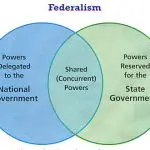
One of the main functions of Australia’s Constitution is to define the law-making or constitutional powers of the Commonwealth and the six State governments. Since the Commonwealth government was created by the Constitution, its powers had to be carefully laid out and defined in the Constitution. And since the States (as colonies) had already been utilising their own law-making powers, the Constitution had to be clear about which powers the States retained, which they surrendered to the Commonwealth and which might be shared by both levels of government. Within the Constitution, law-making powers are classified as specific, concurrent and residual powers:
Specific powers. Specific powers are law-making powers that are specifically allocated to the Commonwealth. They are clearly and explicitly articulated in the text of the Constitution. Specific powers are sometimes called enumerated powers. Most specific powers are contained in Section 51 of the Constitution. Section 51 contains 39 different paragraphs, covering areas as diverse as trade, taxation, postal services, quarantine, weights and measures, marriage and divorce, aged pensions, immigration and foreign affairs. Specific powers can be either exclusive powers or concurrent powers (see below).
Exclusive powers. Exclusive powers are law-making powers granted to the Commonwealth alone; they may only be exercised by the Federal government. An example of a specific power is contained in Section 51(vi) and Section 114, which together grant the Commonwealth the ability to organise and make laws for the military defence of the nation. Section 114 reads in part: “A State shall not, without the consent of the Parliament of the Commonwealth, raise or maintain any naval or military force…” Another is Section 51(xii) and Section 115, which says that a “State shall not coin money, nor make anything but gold and silver coin a legal tender in payment of debts”. Section 90, which deals with customs and excise duties, says that the “power of the [Commonwealth] Parliament to impose duties of customs and of excise, and to grant bounties on the production or export of goods, shall become exclusive.” These three provisions mean the Commonwealth has exclusive power to make laws with regard to military defence, currency and customs duties; the States, therefore, have no authority to legislate in those areas.
Concurrent powers. These are law-making powers shared by the Commonwealth and the States (sometimes in theory more than in practice). Some examples of concurrent powers include the Section 51 paragraphs on marriage, divorce and bankruptcy – both the Commonwealth and the States can make laws relevant to these areas. Taxation is another area where law-making power is concurrent. If there is conflict or contradiction between Commonwealth and State laws, however, Section 109 comes into play (see Restrictions on State and Commonwealth power).
Residual powers. Strictly speaking, residual powers are not mentioned in the Constitution – which means they are the domain of the States. The men who drafted the Constitution did not include every feasible area of law-making, nor did they intend to; that would have been impractical. But they also believed the States should retain the ability to make laws relevant to their regions, their economies and their populations. So, whatever law-making powers aren’t specifically allocated in the Constitution are automatically left to the States. This is outlined in Section 107 (“every power of the Parliament of… a State shall, unless it is by this Constitution exclusively vested in the Parliament of the Commonwealth… continue.”) The most notable residual powers are those concerned with criminal codes and traffic laws, which are mostly administered by the States.
© lawgovpol.com 2014. Content on this page may not be republished or distributed without permission. For more information please refer to our Terms of Use.
